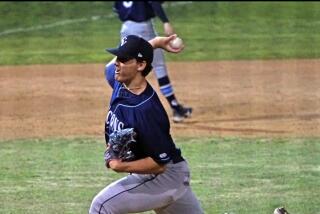Orioles’ Johnson Won’t Let Diabetes Get in Way of Career
- Share via
On his best days, Orioles fifth starter Jason Johnson carries what his manager describes as an “electric” fastball plus an obedient breaking ball and a developing change-up. Johnson also possesses the potential that the club sees in Sidney Ponson and Matt Riley, arms projected as the backbone of their rotation for at least the next four seasons. Johnson also lives with diabetes, a disease so intrusive he often carries a syringe with him to the bullpen. He is never far from the kit that tests his blood sugar level every two or three waking hours.
Millions of Americans live with the condition but only a few pitch professionally with it. Since he was 11 Johnson has suffered from Type I, or juvenile onset, diabetes. It is the more acute strain of the disease and, as in Johnson’s case, often manifests itself by weight loss. It is also more likely to cause complications such as blindness and circulation problems later in life; hence, the necessity for diligent monitoring.
Fluctuating game times and levels of exertion represent an additional challenge to Johnson keeping the condition in check.
“I know I have to be careful. With diabetes, if my blood sugar goes low I can go into insulin shock or pass out,” Johnson says. “It becomes part of your life. It has to.”
Insulin, produced by the pancreas, is necessary for the body to metabolize glucose. If a person’s pancreas doesn’t function properly, there is no way for glucose to be converted.
If the body can’t absorb sugar, a condition called acidosis or “diabetic coma” results.
If exercise causes Johnson’s blood sugar to drop precipitously, he can experience excessive sweating and become light-headed. As a child the condition sent him into shock several times.
“There are always times when your blood sugar gets a little out of control. Now, as an adult, I have a better idea what to do if something happens. It doesn’t limit me in anything I do. It never did, but I had to be a lot more careful when I was younger because I had to get better command of my blood sugar,” Johnson says.
A normal blood sugar reading is between 80-100. Johnson uses a kit to measure it every other inning. Whenever he receives a count below 100 he downs a sports drink that takes him toward the high end of the scale. “If not, I can get lightheaded, real weak and start shaking. That’s definitely a problem if you’re out on the mound pitching,” he says. “But nothing like that has happened to me since I’ve been here. You’re careful.”
Johnson monitors his blood sugar level at least six or seven times a day and injects himself three times daily--early in the morning, around dinner time and around 10 p.m. Saturday’s 4:05 p.m. start against the Anaheim Angels presented a greater challenge because Johnson had not eaten for several hours. Between innings he will check himself by retreating into a storage room adjacent to the dugout.
“A night game is easier because I’m not pitching until after dinner. I get a shot at dinner time but I can always lower my insulin,” Johnson says. “A day game is tough because I have to get a shot at 7:00 a.m. and I don’t play until the afternoon. But it’s nothing I can’t control.”
As a professional athlete, he assumes the same work load--and expectations-as his teammates. Former Montreal Expos pitcher Bill Gullickson enjoyed a productive career while living with the disease. “People who don’t know a lot about it think there are things I can’t do because I’m a diabetic. Some coaches think that because I have diabetes I can’t pitch a complete game because of my blood sugar. But it doesn’t affect the way I pitch or how I go about my business,” Johnson says.
Since being acquired from the Tampa Bay Devil Rays March 29 in exchange for outfielder Danny Clyburn, Johnson has so impressed General Manager Frank Wren and Miller that he has been placed on the organization’s list of “untouchables.” Wren envisions a rotation including Johnson, Sidney Ponson and wunderkind Matt Riley as early as next season.
Johnson has distinguished himself for a willingness to pitch inside and refusal to flinch in difficult situations. “He has enough ability that he can get into a fastball situation with a fastball hitter and still throw a fastball by him for strikes,” says Miller.
“It’s important that young kids who get diabetes know they can do stuff,” Johnson says. “They think, ‘I’m not like everybody else. I can’t go play baseball or basketball.’ It’s not like that at all. I’m proof of that. I’m a major league baseball player.”
More to Read
Go beyond the scoreboard
Get the latest on L.A.'s teams in the daily Sports Report newsletter.
You may occasionally receive promotional content from the Los Angeles Times.










